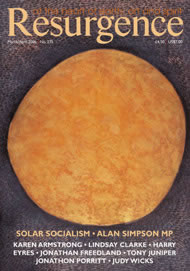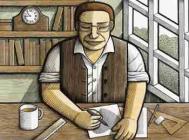THE PLEASURE WE take in becoming skilled is an established scientific fact, and an increasing number of social scientists confirm its vital role in lives and societies. We enter a physiologically distinct state of grace when we gently push the outer boundaries of our abilities, in the arts, in a sport, in a hobby, or in a career. Mihaly Csikszentmihalyi, a psychology professor, systematically explored this satisfying human experience in his book Flow: The Psychology of Optimal Experience. You can find yourself in a mental and spiritual place where you lose track of time; are absorbed in a task, and find your mind delightfully and unstressfully flooded with thoughts related to accomplishing the work before you. We feel this way when we use and expand our skills.
If developing our skills makes us happy, why do we make so much room in our lives for devices that eliminate the need to develop skills? We can buy, for example, a bread-making machine - but for most of us, the real pleasure in making bread comes from skilfully kneading the dough, and from involving ourselves in managing the bread’s rising and baking. Using a bread-making machine is surprisingly unsatisfying.
I suppose we delude ourselves that the mere physical production of a result is the rewarding part of an experience. After all, isn’t that the reason for developing skills - to produce that high-quality outcome? We can forget that getting there is more than half the fun. This is an easy assumption to make, as our advertising-saturated world focuses so intently on products as instant satisfactions - on products as answers to our needs.
Also - let’s face it - sometimes the early steps of developing a skill place you in the zone somewhere between boredom and frustration. You’d be hard pressed to find someone who remembers their childhood piano scales as unalloyed bliss, and the thumpy twangs and throbbing blisters of my early guitar-playing did not produce satisfying serenity. Yet I soldiered on. I was inspired by the music produced by friends who played just a little better than me. I also had enough experiences, in other areas, of slogging through pain and puzzlement to finally arrive at a happier and more accomplished place.
Is the experience of flow disappearing from our lives and our culture? This could explain the prevalence of the many soulless shortcuts now in the marketplace. For an increasing number of workers in Western countries, having and developing skills is not prevalent in their work lives. Globalisation is deskilling many people.
THE SAME WORLDVIEW, attitudes and context that have deskilled work are now deskilling our leisure. “Our consumption of music, food, and so forth is distilled down to its most essential elements and the personal enrichment that one derives from the experience is undermined - and ultimately discarded,” says Dr Maurie Cohen, who studies sustainable consumption at the New Jersey Institute of Technology. “We boil everything down to ‘The Idiot’s Guide to X’.”
The consequences are tangible indeed: increasingly deskilled leisure also results in greater spending and increased consumption. Companies make money because we buy into their promises of instant satisfaction. We come to crave the instantaneous thrill instead of the slow and steady development of competence - to the detriment of our pockets and the planet. A piano may be a substantial collection of resources and parts, but properly maintained it can last centuries. This season’s latest skill-free gizmo, in contrast, not only fails to satisfy but usually also fails to last.
Most of us also live time-constrained lives. We fill our lives with short-cut end-products that should have been produced through time-filled pleasure, hoping the object or truncated experience will provide a faint echo of the happy events we skipped. Perhaps only now have we sufficient time and inner resources for shadows and dreams, for nostalgia.
It is no wonder that our stores offer so many products that rob us of leisure (and leisurely) skills, or that so many of us irrationally use them, skipping profound satisfactions in the process and also contributing to an increasingly deskilled society. After all, individual choices to miss the joy of skill development are regrettable enough, but collectively they impinge even further on our capacity for soul-sustaining pleasure. Unengaged and unenthralled by the ‘skills substitutes’ we buy, we can conclude that the hobby or art that the device purportedly helps us experience is boring - or “not for me”. What is to keep the disappointed bread-making machine owner from concluding that cooking is unsatisfying, since they think that they have had a real cooking experience? Whole realms of happiness and culturally meaningful pursuits are in this way lost to us, and we also lose the assurance that, with a little persistence, we can achieve and we can attain.
PUBLIC HEALTH ADVOCATES note another unanticipated outcome of our quest for skill-less short-cuts. This quest often involves devices that are also labour-saving (the bread machine, for example) contributing significantly to an obesity epidemic. Dr Jeffrey P. Koplan, co-author of a 1999 obesity study published in the Journal of the American Medical Association, states that “the American lifestyle of convenience and inactivity has had a devastating toll on every segment of society…”
Clearly not every skill we use involves substantial movement, but the more we substitute devices for work, the less we accomplish tasks through the inherently satisfying use of our skills, and the less healthy we will be. Again and again, modern market solutions promise simple pleasures that not only fail to satisfy, but erode our ability to experience true satisfaction, and imperil things we value. We save time, but lose fitness. We buy ersatz mastery, but lose the joy of slowly making ourselves.
This is the true job in life,
The being used for a purpose recognised by yourself
As a mighty one,
The being a force of nature instead of a feverish,
Selfish little clod of ailments and grievances
Complaining that the world
Will not devote itself to making you happy.
I am of the opinion that my life belongs to the
Whole community and as long as I live it is my
Privilege to do for it whatever I can.
I want to be thoroughly used up when I die,
For the harder I work the more I live.
I rejoice in life for its own sake;
Life is no brief candle to me,
It is a sort of splendid torch
Which I have got hold of for the moment,
And I want to make it burn as brightly
As possible before handing it on
To future generations.
George Bernard Shaw








